Advances in dental technology today offer safe, more comfortable, and natural-looking alternatives: fixed dental prostheses. Also known as implant-supported dentures, permanent dentures are revolutionizing restorative dentistry by providing patients with stable, long-term options that optimally mimic the appearance and function of natural teeth. This article is aimed at people suffering from tooth loss who want to learn about modern, fixed dental restoration solutions to improve their quality of life, appearance, and self-confidence in the long term.
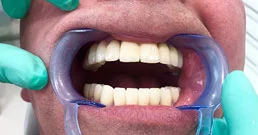
Tooth loss doesn’t just affect chewing or speaking. In the middle of life, you can no longer laugh so carefree, you feel insecure in everyday life. Self-confidence suffers and with it, general well-being. In short: it’s not just about teeth, but about a piece of quality of life. For a long time, classic, removable dentures were considered the standard solution. Practical, yes – but not always comfortable, and certainly not the ideal choice for everyone. Today, that’s different: Thanks to modern dentistry, there are alternatives that are more stable, more comfortable, and look more natural. We’re talking about fixed dental prostheses. Known as implant-supported dentures, this method has fundamentally changed modern dentistry. Why? Because it offers a solution that not only sits firmly and lasts for many years but is also visually almost indistinguishable from real teeth. And the best part: it really feels like real teeth. It’s this natural feeling that most patients long for – to be able to laugh freely again, speak relaxed, and eat with enjoyment, without constantly being reminded of a denture in the back of their mind.
What is a fixed denture?
A fixed denture is a dental prosthesis that – unlike a classic removable denture – you cannot simply remove yourself. It sits securely in the mouth, anchored either to dental implants or to your own, still existing teeth. What’s special about it? It replaces several missing teeth at once and gives you the feeling of having completely normal, fixed teeth again. No wobbling, no removal – but a dental prosthesis that naturally becomes part of your everyday life.
The types of Fixed Dentures
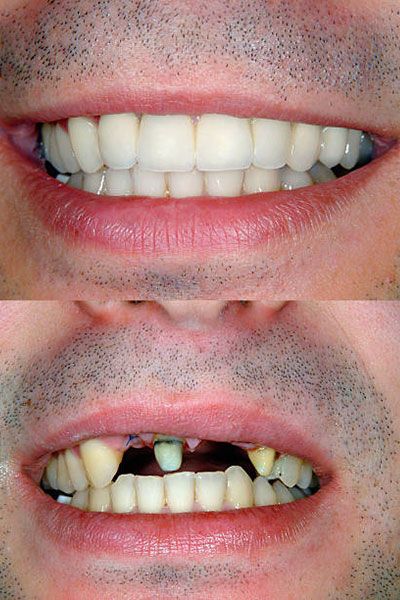
Bar retained dentures
Clasps are predominantly used to fix partial dentures. One needs a partial denture if only some teeth are missing, meaning a smaller gap needs to be closed. Such partial dentures have numerous advantages. On one hand, they restore chewing function, on the other hand, they prevent teeth from moving towards the gaps. Thirdly, partial dentures improve the facial aesthetics of the patient, especially with front teeth.
In this solution, a metal framework carries the artificial teeth, which ends in clasps. With clasps, they are fixed to healthy teeth. Their advantage is that a clasp denture remains stable in the mouth and holds the artificial teeth firmly. Their disadvantage is that the clasps can be visible, which is not very aesthetic. Furthermore, among their disadvantages is that they stress and wear down the healthy teeth they rely on.
Dental bridges
Dental bridges are a modern and widely used choice of fixed dental prostheses. There are numerous types of bridges. From bridges with metal crowns and porcelain coating to pressed ceramic bridges and zirconia bridges.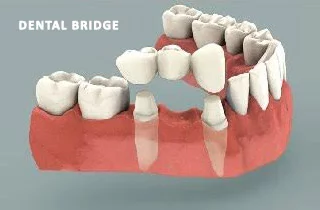
In this method, the dentist grinds down the healthy teeth next to the gap so that the dental bridge can be securely fixed onto them. The two outer elements of the prosthesis are each a crown that fits onto the ground abutment teeth. Between them, the artificial teeth are fixed, closing the gap.
This method is excellent for closing larger gaps and replacing several teeth. Its disadvantage is that abutment teeth must be ground down. This means that even completely healthy tooth substance must be partially removed for the procedure to be performed.
For closing larger gaps, dental bridges with metal frameworks or zirconia bridges, which are exceptionally strong, are recommended. Metal-free pressed ceramic bridges (made solely from porcelain) are unsuitable for these purposes because they cannot resist bending forces.
There is a solution with which a maximum of two teeth can be replaced. In this solution, the abutment teeth are not ground down. A small indentation is made in their surfaces. The two outer structures of the bridge are fixed as dental inlays into these indentations.
Fixed implant supported dentures
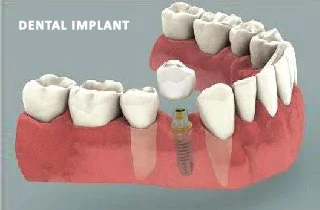 Nowadays, implant-supported dentures are the most modern procedure. Their great advantage is that they spare healthy teeth. Dental Crowns are fixed not onto ground abutment teeth but onto implants that have been fixed into the jawbone. Two, well-osseointegrated artificial teeth already offer wonderful stability for dental bridges of average length.
Nowadays, implant-supported dentures are the most modern procedure. Their great advantage is that they spare healthy teeth. Dental Crowns are fixed not onto ground abutment teeth but onto implants that have been fixed into the jawbone. Two, well-osseointegrated artificial teeth already offer wonderful stability for dental bridges of average length.
If many or all teeth are missing, several bridges are fixed to several implants. This way, even entire upper or lower rows of teeth can be replaced long-term.
A disadvantage of the method is that it is time-consuming. Traditionally (grinding abutment teeth), the patient gets the fixed prosthesis within a few weeks. Fixed dental prostheses are fixed onto dental implants after about half a year. That’s how much time the artificial Tooth Root needs to heal completely and osseointegrate. The patient must endure a minor dental procedure. But the long-term benefits compensate for the inconveniences. For those who have lost their teeth, All-On-4 dentures are a revolutionary and stable solution.
Complete fixed dentures
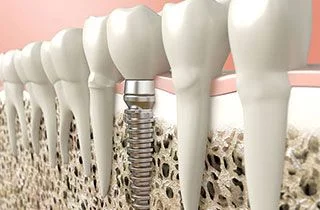 People who wear removable complete dentures can hope for an improvement in their quality of life from implants. In a completely toothless mouth, adhesion force, muscle tone, and gravitational force hold the denture in place. When chewing and speaking, these together still don’t provide proper hold. Two implants in the lower jaw and four in the upper jaw offer wonderful stability for removable dentures. Speaking and chewing become safer and one becomes more self-confident.
People who wear removable complete dentures can hope for an improvement in their quality of life from implants. In a completely toothless mouth, adhesion force, muscle tone, and gravitational force hold the denture in place. When chewing and speaking, these together still don’t provide proper hold. Two implants in the lower jaw and four in the upper jaw offer wonderful stability for removable dentures. Speaking and chewing become safer and one becomes more self-confident.
Patients who are suitable for dental implants can also consider a swap. That means, with a few more implants, they can have their removable complete dentures exchanged for more comfortable, fixed dental bridges. How do I choose: dental bridge or implant?
Which is better, fixed or removable dentures?
Both fixed and removable dental prostheses have their own advantages. Which dental prosthesis is better suited depends on individual needs and possibilities. Furthermore, there may be hybrid solutions that, for example, combine fixed and removable options.
Fixed Dentures
- Stability: Securely anchored with implants or dental crown; does not shift or move.
- Comfort: Feels more like natural teeth; less irritation to gums.
- Function: Better chewing efficiency and speech clarity.
- Aesthetics: More natural appearance due to custom fitting and integration.
- Maintenance: Cleaned like natural teeth but may require professional check-ups.
- Longevity: Can last many years or even decades with proper care.
- Cost: More expensive due to surgery and materials.
Removable Dentures
- Stability: May slip or move, especially while eating or speaking.
- Comfort: May cause sore spots or discomfort over time.
- Function: Less effective in chewing and may affect speech.
- Aesthetics: Can look natural, but may not match the realism of fixed options.
- Maintenance: Must be removed and cleaned daily.
- Longevity: May need replacement or adjustment every 5–10 years.
- Cost: More affordable initially, making them accessible for more patients.
What Are the Disadvantages of Fixed Dentures?
- High Initial cost: Fixed dentures, especially implant-supported types, require significant investment due to surgery, materials, and lab work.
- Surgical Procedure Required: Dental implants involve surgery, which may not be suitable for all patients, especially those with health issues.
- Long Treatment Time: The process from consultation to final placement can take several months.
- Not Reversible: Once placed, implants or altered teeth cannot be restored to their original state.
- Risk of complications: Though rare, risks include infection, implant failure, or bone loss over time.
How Long Do Fixed Dentures Last?
- Implant-supported dentures: Can last **15–25 years or more**, with the implants themselves often lasting a lifetime if properly cared for.
- The prosthetic (denture) part: May need replacement or adjustments every 10–15 years, depending on wear, bone changes, and hygiene.
Why Are Fixed Dentures So Expensive?
- Surgical Expertise: Placement requires skilled oral surgeons or implantologists.
- High-Quality Materials: Titanium implants, ceramic or zirconia teeth, and custom prosthetics are costly to produce.
- Advanced Technology: CT scans, 3D modelling, and digital planning tools add to the cost.
- Labour-Intensive Process: Multiple appointments, lab work, and precision fittings require time and effort.
Can You Sleep with Fixed Dentures?
Yes. Unlike removable dentures, fixed dentures are designed to stay in place 24/7, including while you sleep. However, maintaining excellent oral hygiene is crucial to prevent infections or gum inflammation around the implants or supporting structures.
Can You Eat with Fixed Dentures?
Absolutely. Fixed dentures are stable and allow you to eat a wide variety of foods, including chewy and crunchy items. They function much like natural teeth and do not move or shift during chewing. Patients are usually advised to avoid extremely hard foods (like ice or hard candy) to protect the prosthetic teeth. Check our dental implants before and after reviews.


